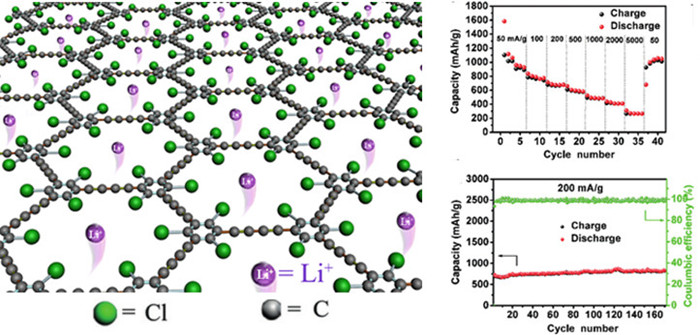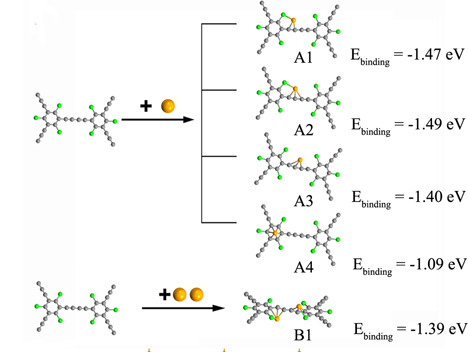A “Bottom-to-Up” Strategy to Prepare New Carbon Rich Materials
Energy is a matter of our future. Whether in production, storage or use of energy, carbon materials could provide a good solution. They are closely related to human life and are regarded as one of the most promising candidates for the flexible electrodes in energy storage devices.
Recently, a research team from Qingdao Institute of Bioenergy and Bioprocess Technology (QIBEBT), Chinese Academy of Sciences (CAS), prepared a well-defined two-dimensional carbon rich materials named chlorine substituted graphdiyne (Cl-GDY) through chemical method, which was a more efficient way to introduce hetero atoms into carbon materials compared to the post-treating method (Figure A).
The calculation results indicated that the chlorine atoms were homogeneously distributed in the two dimensional molecular plane, which would stabilize the Li atoms intercalated in the Cl-GDY framework, and thus generated more storage sites (Figure B). The Cl-GDY film on copper foil was explored as an anode material in practical LIBs, which achieved a highly improved reversible capacity of 1150 mA h g-1 at current density of 50 mA g?1 and a stable specific capacity around 500 mA h g-1 for 500 cycles at the current density as higher as 2 A g-1 in lithium ion half cells.

Figure A. The structure of Cl-GDY and its application in Lithium-ion battery. (Image by WANG Ning)

Figure B. The geometries and formation energies (Ebinding) of four optimized Li+C28Cl6 (A1-A4) complex and one optimized 2Li+C28Cl6. (gray circles: C; green circles: Cl; orange circles: Li). (Image by WANG Ning)
The related work was published in Angewandte Chemie International Edition . This study was supported by Frontier Science Research Project of the CAS (QYZDB-SSW-JSC052), the Strategic Priority Research Program of the CAS (Grant No. XDB12020200), the Natural Science Foundation of Shandong Province (China) for Distinguished Young Scholars (JQ201610), and the National Natural Science Foundation of China.
(Text by LV Qing)
Cotact:
Prof. Huang Changshui, Ph.D,
Qingdao Institute of BioEnergy and Bioprocess Technology, CAS
(http://english.qibebt.cas.cn/)
Qingdao, Shandong, 266000, China,
Tel: 86-532-80662743
E-mail: huangcs@qibebt.ac.cn